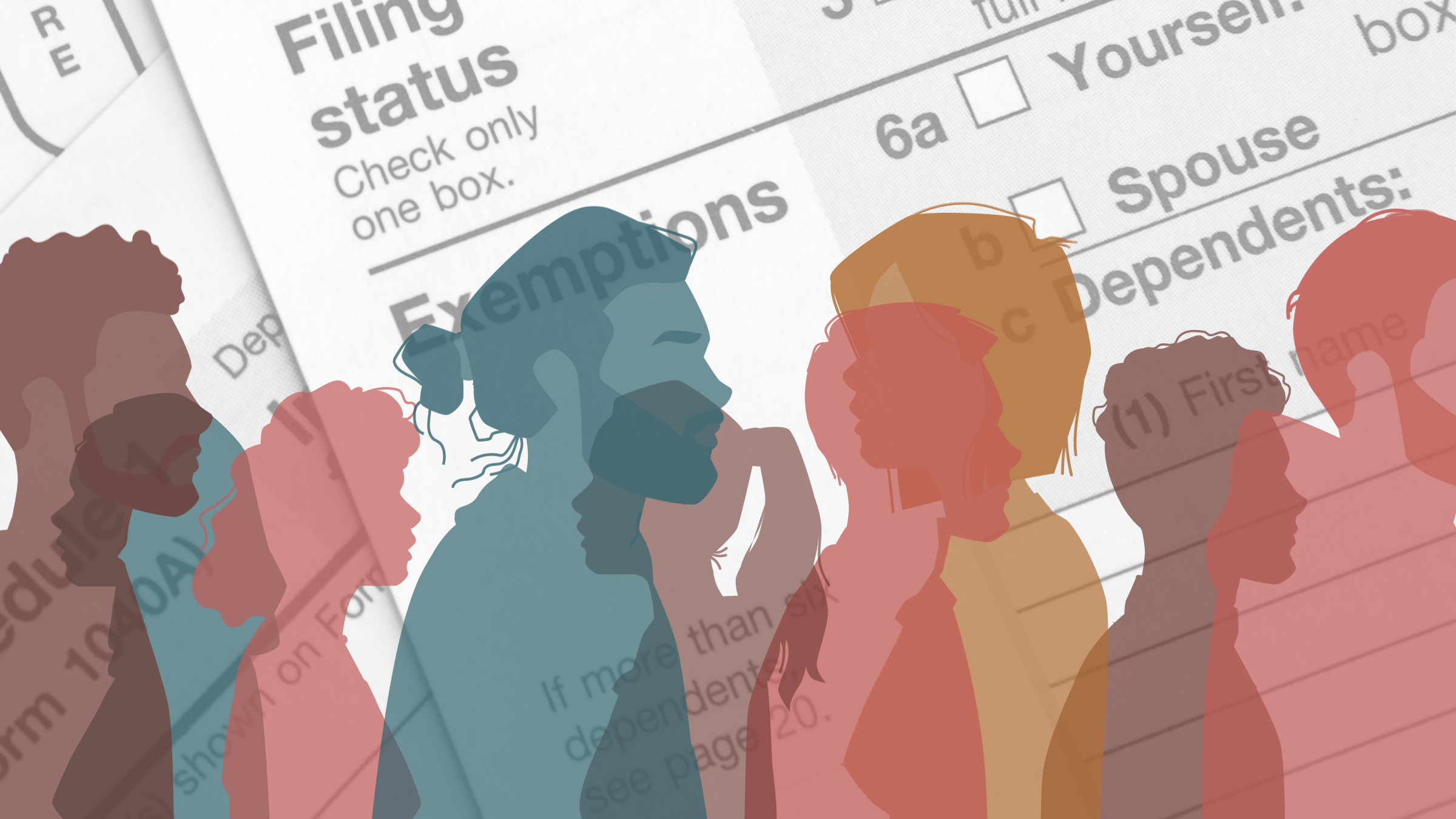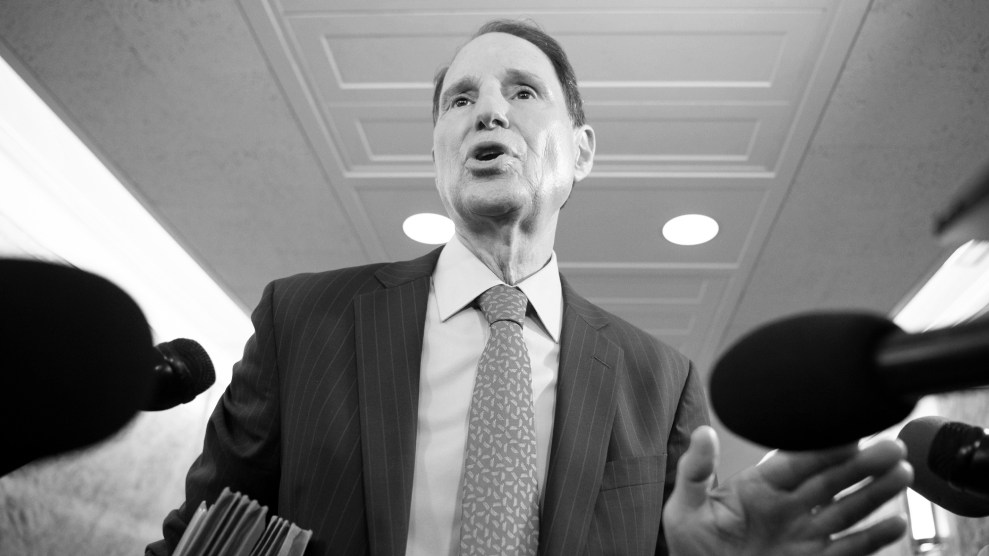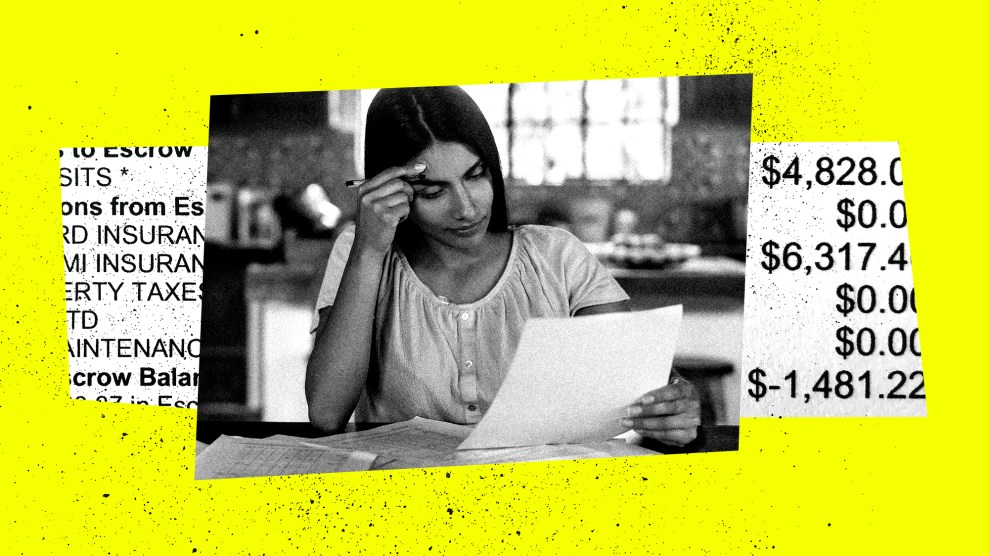This story was published in partnership with the Center for Public Integrity, a nonprofit newsroom that investigates inequality.
Oregon taxpayers will become some of the first in the nation to have the option to self-identify their race and ethnicity when they file their tax returns next year.
The reason is both simple and complex: Especially at the state level, taxes worsen America’s yawning wealth gaps rather than easing them. A growing number of advocates and policymakers are trying to do something about that.
“By allowing this data to be collected, we can begin to look at how to dismantle the racism intrinsically woven into our tax system, and the race-related distributional impacts,” Creeana Bort, policy and advocacy organizer at the NAYA Action Fund, said in written testimony supporting the Oregon race and ethnicity self-identification bill that passed last year. “We can begin to understand tax policy and how to move forward in creating a tax system that is equitable for all Oregonians.”
State revenue agencies handling tax collection don’t tend to track demographic data that can make clear how impacts differ by race. But it’s already apparent these disparities exist. People with less money pay a greater share of it in state and local taxes than wealthy residents, who are disproportionately white.
And states more aggressively collect on tax debts from people in financial hardship than the Internal Revenue Service does, in ways that often make it harder for low-income residents to pay what they owe.
A Center for Public Integrity investigation in December found that at least nine states can suspend or decline to renew driver’s licenses over unpaid income taxes, some over small debts. At least 16 states and Washington, DC, can do the same to professional licenses, cutting people off from their best chance at repayment.
Low-income taxpayer attorneys and other experts say clear paths exist for states to do better.
Having a robust taxpayer advocate’s office to help people navigate collections and other tax problems is one such option. At least 34 states and the District of Columbia have an office, but they vary drastically in how well they are staffed and funded.
Another option? Data collection to better track how tax policies affect people by race and income, and to determine whether some practices are counterproductive.
States that suspend driver’s or professional licenses can set their debt thresholds higher so lower-income people who need those licenses to work and meet basic needs are less likely to lose them, attorneys and advocates said in interviews.
And, they say, states could make tax debt collection less harmful to low-income people simply by mirroring IRS standards. The IRS offers more significant hardship options than most states.
"First, collection alternatives based on hardship are necessary,” Anna Gooch with the Center for Taxpayer Rights said in an email. “Even if a state is constitutionally prohibited from compromising debt, there are several alternatives that would limit the harmful effects of enforced collection, including partial pay installment agreements.”
Second, she said, states must do a better job explaining what their hardship help entails and who can get it. Public Integrity’s investigation found that most states offer incomplete information online, and when we asked them for more details, the answers rarely filled all the gaps.
State revenue agencies can make some changes on their own—offering more publicly available information, for instance.
Other approaches require legislative action. Local advocates convinced elected officials to change collections policy in Washington, DC, for example.
And states can choose to alter their tax structure so it weighs less heavily on those who make less money.
North Dakota’s personal income tax rate for lower- and moderate-income residents was a slim 1.1% before legislators voted last year to change it—to zero.
And the rate of people behind on their income taxes there, North Dakota Tax Commissioner Brian Kroshus said, is very low.
He doesn’t think that’s a coincidence.
“You have to look at wages and tax burdens,” Kroshus said. “We have the lowest rates in the nation for any states that have a bracket system in place.”
With the 2023 rate changes, roughly six of every 10 North Dakotans won’t owe personal income taxes to the state, Kroshus said. He expects the number of people who can’t pay their taxes will fall even further.
As in most of the country, state and local taxes in North Dakota still collectively take a higher share of family income from people in the bottom 20% than the top 1%, according to the Institute on Taxation and Economic Policy. The reliance on sales taxes plays a big role in this inequity since they place a higher burden on lower-income residents.
But, the income-tax changes in the state will help with tax-debt struggles.
“The universe of people who owe taxes got smaller,” Kroshus said. “And for those that remain with taxes owed, because of the lower rates, that will also result in a higher level of compliance.”
Pushing for change
DC’s Clean Hands Law mandates that people applying for or renewing professional licenses must get a certificate verifying they are up to date on their taxes and any fines and fees. People who owe more than $100 won’t qualify for the certificate—or the license.
When it was first passed in 1996, the law’s purpose was to deter littering, illegal dumping, and delinquent tax filing. But amendments since then expanded its scope to any fines, penalties, or interest of more than $100, along with unpaid towing fees of any amount and failure to file a D.C. tax return.
Tzedek DC, which provides legal assistance to low-income people dealing with debt collection and other consumer challenges, is working to change that. More than 125 occupations require a license.
“That's nearly one in five DC workers who must comply with this law or not be able to work in their chosen profession,” said A.J. Huber, a senior staff attorney at Tzedek DC. “That includes barbers, cosmetologists, nurses, social workers, plumbers, HVAC cleaners, food vendors, tattoo artists, and dozens of other, mostly blue-collar occupations.”
The Clean Hands Law used to block people who owed the city more than $100 from getting or renewing driver’s licenses, too. Tzedek DC spent years pushing for legislative change, publishing a report in 2021 about the equity and other issues with the law.
The DC Council voted in 2022 to remove driver’s license suspensions from the law, but not until October 2023, citing budget concerns.
After Tzedek DC filed a lawsuit, a federal judge ordered officials in December 2022 to halt the practice immediately. But the law still applies to vehicle registrations, meaning that someone who owes more than $100 to the city can’t drive their own car without risking tickets and fines. Legislation filed with the DC Council in January would allow people with such debts to register one vehicle apiece.
“I have no idea if the Council will pick it up, how it's all going to shake out,” said Sam Pannell, policy associate at Tzedek DC. “But it was nice to know that at least one of the Council members noticed.”
Last year, Tzedek DC published another report, this one detailing how professional license suspensions perpetuate a cycle of poverty and increase the wealth gap between white and Black DC residents.
DC Councilmember Kenyan McDuffie filed legislation in December that would raise the debt threshold for license suspensions from over $100 to over $2,500. As with the vehicle registration bill, the council has not taken it up for a vote yet.
Tzedek DC, which supports that bill, suggests additional ways DC could collect debt in a more equitable way: Removing a requirement to make a down payment in order to be allowed onto a repayment plan. Allowing workers to pay off their debt within a fixed period after their license is issued, rather than requiring it upfront. Offering repayment plans that better account for individuals’ financial circumstances.
The organization also recommended better transparency about the impact of the Clean Hands Law by race, job, and income level.
One key to legislative change: Affected people showing up to explain how they’ve been harmed.
“I think a lot of people when they just hear about the issue abstractly think, ‘Oh, it's just a bunch of people who don't want to pay their bills,’” Huber said. “And that's really not what it is. It’s people who are in tough financial circumstances and whose circumstances are becoming even tougher because of this law.”
During the early part of the pandemic, for example, street vendors in DC couldn’t work. But the fees they were required to pay as vendors kept mounting and some lost their vending licenses, unable to cover the expense.
The DC Council’s Street Vendor Advancement Amendment Act of 2023 forgives qualified vendors’ delinquent fines and tax debt accrued between 2010 and July 1, 2023.
Some vendors haven’t been able to access that help yet, and it doesn’t apply to people seeking other types of occupational licenses. In June, Tzedek DC filed a lawsuit asking the court to prohibit local officials from making occupational licensing dependent on a Clean Hands certificate.
“Litigation is always an option,” Huber said. “There’s a lot of good case law to support people's right to obtain driver’s licenses and occupational licenses, and that even if they're not able to pay certain amounts they should still have access to those.”
Louisiana Appleseed has also been pushing elected officials in its state to make changes to a law that allows suspension of driver’s licenses for debts over $1,000. Data obtained by Public Integrity showed more than 19,000 suspensions last year alone.
The overwhelming majority of suspended driver’s licenses in Louisiana are for non-moving violations, from tax debt to failure to appear in court, Louisiana Appleseed revealed in a 2021 report. That research is credited with spurring a law that ended automatic suspensions, giving people 120 days to pay their fines or get on a payment plan.
But the state’s payment plan is difficult for low-income people to qualify for because it requires a 20 percent down payment, Public Integrity’s investigation showed.
Louisiana Appleseed argues that license suspensions for non-moving violations hurt the state’s economy. In a December report, the group said only a fraction of the more than 172,000 such suspensions in the 2020 fiscal year were reinstated in that same year.
Ifeyinwa F. Davis, Louisiana Appleseed’s policy analyst, said the report was prompted by legislator questions about the financial impact of not suspending licenses. She wanted them to consider the financial impact of the status quo, which the group says is costing the state money.
“My argument ultimately was that we have to do something different because this isn't working and this isn’t beneficial,” Davis said. “So this was step one in acknowledging that, yes, I understand the economic concerns, but we're not actually reaping any of that money anyway. And so we would have to come up with something new.”
Making the taxpayer experience easier
In 2020, Codi Trudell embarked on a one-year investigation for the Oregon Department of Revenue to look into creating the state’s first taxpayer advocate office.
Legislative attempts to create such an office in 2011 and 2017 had failed.
Three months into Trudell’s work, state Rep. Julie Fahey proposed a new bill to create the office after her staff helped a constituent with a complex tax case, she said in a hearing about the bill.
In 2021, Oregon became the 34th state in the country—plus DC—to create an advocate office.
“To improve voluntary compliance with tax filing and embed a lens of equity and access to agency information and resources, the agency must expand opportunities to proactively connect with taxpayers, break down barriers, and build relationships with community-based organizations,” Trudell, now the head of the advocate office, wrote in her report. “The office of the Taxpayer Advocate will serve as a liaison toward achieving these objectives.”
While most states have a taxpayer advocate in some shape or form, they vary greatly.
The Missouri legislature created such an office in 2015, for example, but it was never staffed because the legislature never funded the office.
“There should absolutely be one at the state level,” said Sarah Narkiewicz, director of the Low Income Taxpayer Clinic at Washington University in St. Louis’ School of Law. “They just help you navigate the system.”
Oregon’s Trudell found that some states, like California, have multiple full-time staff, while others have only a part-time person assigned to the job. Most states have at least one full-time employee, sometimes referred to as the ombudsman or the head of the “problem resolution” office.
The main job of taxpayer advocates is to give taxpayers another place to turn to for help if regular channels aren’t working, Trudell wrote in her report.
Trudell’s office, currently three people including herself, incorporates many of the best practices she identified. The office can examine both individual and systemic taxpayer issues, must report annually to the state Legislature, and is independent but exists within the Department of Revenue so it is easier to help taxpayers resolve issues with the department.
Residents with a tax problem are often relieved to have someone in the agency to call whose job isn’t to collect.
“Most people in those situations view us as a safer spot to have a conversation to start with,” Trudell said in an interview.
In its first year of operation, Trudell’s office fielded 687 calls—a number she expects will grow as people learn her office exists.
Most of the calls in that first year were resolved by directing someone to the correct unit or resource at the Department of Revenue, or answering questions about deadlines and other rules. But speaking with taxpayers helped Trudell identify a collections policy people were struggling with.
Oregon allows taxpayers in financial hardship to request that the state settle tax debt for less than the full amount. Trudell heard low-income people in particular were finding the program difficult to navigate because the agency requires a lot of information from applicants.
When she brought this issue to the attention of the department, she learned that officials were working on a new proactive settlement program: Staff would reach out to people who could qualify, rather than waiting for applications.
A taxpayer advocate isn’t the only way a state can help people resolve problems in a complicated system. Additional funding for low- to no-cost attorneys expands the work they can do. Low-income taxpayer clinics often struggle to get money to work on state, rather than federal, tax issues. Most states don’t provide that support.
Legal Services of New Jersey is in the midst of trying to expand the assistance it can provide to low-income residents dealing with the state’s tax court.
“This was a project which started with a conversation with the court,” said Akil Roper, senior vice president of Legal Services of New Jersey. “They emphasized this need for folks who are low income and are having difficulty navigating the state tax court.”
But that effort isn’t funded yet. Roper said the program is moving slowly because it relies on attorneys volunteering their time.
“You got to fund these projects,” Roper said. “If they're not funded, then it's gonna be very difficult to get it going.”
Correction, February 29: An earlier version of this story misstated when the voluntary racial and ethnic data question will go on Oregon tax forms. Taxpayers will have the option to self-identify their race and ethnicity in 2025 for the 2024 tax year.
















